Alabama leaders call for increased U.S. defense spending

Rep. Mike Rogers, Ranking Member of the House Armed Services Committee, released a statement opposing the House Democrats’ discretionary topline number the House will vote on today. According to the press release, the 2022 budget number cuts $16 billion from President Biden’s budget but does not detail where that cut comes from. According to Defensenews.com, the resolution’s top line is a close match to President Joe Biden’s budget request. His request proposes $769 billion in nondefense spending, a 16 percent increase from enacted levels last year, and $753 billion for national security, which is a 1.7 percent increase. Republicans are arguing that the amount is too low, while Democrats argue it’s too high. Rogers stated, “The House Democrats’ budget number cuts $16 billion from President Biden’s budget. President Biden’s woefully inadequate defense budget already constitutes a cut of over $4 billion in real dollars. As the House authorization and appropriations process moves forward, not one cent of that $16 billion cut can come from national defense accounts.” In related defense spending news, Rep. Rogers posted on Twitter, “Great talking with VADM Hill about adequately funding U.S. missile defenses. I conveyed that we need to get NGI online and replenish Iron Dome. The Biden budget cuts missile defense and short-changes defense of Guam and Hawaii. Our warfighters deserve better.” Rogers joins Rep. Jerry Carl and Mo Brooks in a call for more missile defense spending for the 2022 budget. According to Yellowhammer News, Brooks and Carl submitted a request for increased funding for several of the nation’s missile defense programs, many of which have Alabama connections. Brooks stated, “My House Armed Services Committee colleagues and I were extremely disappointed to see President Joe Biden’s $8.9 billion budget request for Fiscal Year 2022 fall short of the $10.5 billion enacted in Fiscal Year 2021. If we don’t robustly support missile defense programs, America will be less prepared to defend itself against attack and rogue nations might attempt to exploit missile defense weaknesses. America must never allow our adversaries to mistakenly believe they can defeat us. We must adequately fund our nation’s most effective and vital deterrents.”
Ex-Donald Trump adviser arrives to testify in impeachment inquiry
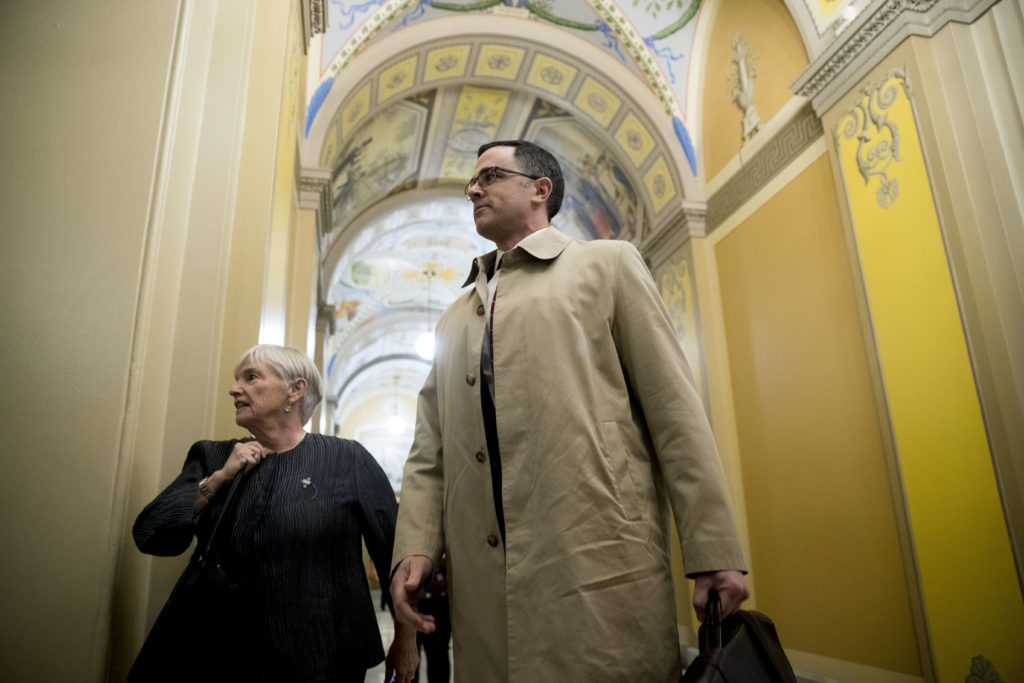
President Donald Trump’s former top adviser for Russian and European affairs arrived on Capitol Hill Thursday to testify to House impeachment investigators, a day after leaving his job at the White House. Tim Morrison, the first White House political appointee to testify, didn’t respond to reporters’ questions about his testimony, which takes place behind closed doors, but his information might be central to a push to remove the president from office. Morrison, who served on the National Security Council, stepped down from that post Wednesday, and a senior administration official said he “decided to pursue other opportunities.” The official, who was not authorized to discuss Morrison’s job and spoke only on the condition of anonymity, said Morrison has been considering leaving the administration for “some time.” He has been in the spotlight since August when a government whistleblower said multiple U.S. officials had said Trump was “using the power of his office to solicit interference from a foreign country in the 2020 U.S. election.” Morrison will be asked to explain that “sinking feeling” he got when Trump demanded that Ukraine’s president investigate former Vice President Joe Biden and meddling in the 2016 election. Morrison was brought on board by then-national security adviser John Bolton to address arms control matters and later shifted into his current role as a top Russia and Europe adviser. It was there that he stepped into the thick of an in-house squabble about the activities of Trump’s personal attorney Rudy Giuliani, who had been conversing with Ukrainian leaders outside of traditional U.S. diplomatic circles. Known as a “hawk” in national security circles, Morrison is the first political appointee from the White House to testify before impeachment investigators. The probe has been denounced by the Republican president, who has directed his staff not to testify. Regardless of what he says, GOP lawmakers will be hard-pressed to dismiss Morrison, formerly a longtime Republican staffer at the House Armed Services Committee. He’s been bouncing around Washington in Republican positions for two decades, having worked for Rep. Mark Kennedy, Republican-Minnesota, Sen. Jon Kyl, Republican-Arizona, and as a GOP senior staffer on the House Armed Services Committee, including nearly four years when it was chaired by Rep. Mac Thornberry, Republican-Texas. Morrison’s name appeared more than a dozen times in earlier testimony by William Taylor, the acting U.S. ambassador in Ukraine, who told impeachment investigators that Trump was withholding military aid unless the new Ukrainian president, Volodymyr Zelenskiy, went public with a promise to investigate Trump’s political rival Joe Biden and his son Hunter. Taylor’s testimony contradicts Trump’s repeated denials that there was any quid pro quo. Taylor said Morrison recounted a conversation that Gordon Sondland, America’s ambassador to the European Union, had with a top aide to Zelenskiy named Andriy Yermak. Taylor said Morrison told him security assistance would not materialize until Zelenskiy committed to investigate Burisma, a Ukrainian gas company that once employed Biden’s son. A White House meeting for Zelenskiy also was in play. “I was alarmed by what Mr. Morrison told me about the Sondland-Yermak conversation,” Taylor testified. “This was the first time I had heard that the security assistance — not just the White House meeting — was conditioned on the investigations.” Taylor testified that Morrison told him he had a “sinking feeling” after learning about a Sept. 7 conversation Sondland had with Trump. “According to Mr. Morrison, President Trump told Ambassador Sondland that he was not asking for a quid pro quo,” Taylor testified. “But President Trump did insist that President Zelenskiy go to a microphone and say he is opening investigations of Biden and 2016 election interference, and that President Zelenskiy should want to do this himself. Mr. Morrison said that he told Ambassador Bolton and the NSC lawyers of this phone call between President Trump and Ambassador Sondland.” Morrison told people after Bolton was forced out of his job that the national security adviser had tried to stop Giuliani’s diplomatic dealings with Ukraine and that Morrison agreed, according to a U.S. official, who was not authorized to discuss Morrison’s role in the impeachment inquiry and spoke only on condition of anonymity. The official said Morrison told people that with the appointment of Robert O’Brien as Bolton’s successor, his own future work at the NSC was in a “holding pattern.” Bolton had brought Morrison into the NSC in July 2018 as senior director for weapons of mass destruction and biodefence. He’s known as an arms control expert or an arms treaty saboteur, depending on who you ask. Morrison, who earned a bachelor’s degree from the University of Minnesota and a law degree from George Washington University, keeps nuclear strategist Herman Kahn’s seminal volume on thermonuclear warfare on a table in his office. Daryl Kimball, executive director of the Arms Control Association, said Bolton and Morrison are likeminded. Kimball said both have been known for calling up GOP congressional offices warning them against saying anything about arms control that didn’t align with their views. “Just as John Bolton reportedly did, I would be shocked if Morrison did not regard Giuliani’s activities as being out of bounds,” said Kimball, who has been on opposite sides of arms control debates with Morrison for more than a decade. By Deb Riechmann Associated Press Associated Press writers Zeke Miller and Matthew Lee contributed to this report. Republished with the permission of the Associated Press.
Bradley Byrne: How do you solve a problem like Syria?
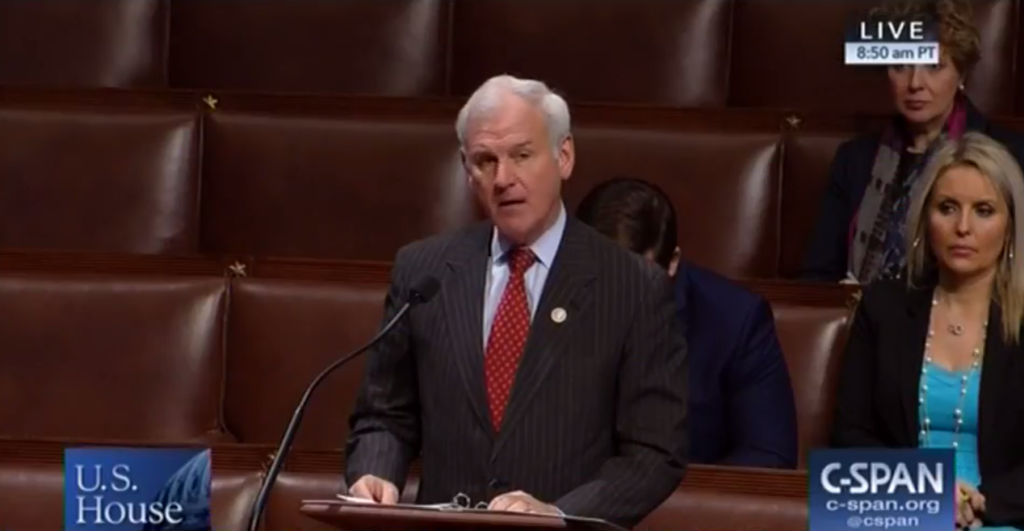
Recent developments in Syria highlight the need for the United States to revisit its broader Middle Eastern policy. Early last week, I joined a small meeting of House Republicans for an update on Syria from Secretary of Defense Mark Esper where he discussed a phone call from President Recep Tayyip Erdogan of Turkey to President Donald Trump. During that call, Erdogan notified President Trump that after years of waiting at the Syrian border, Turkish troops would finally cross over. He assured that Turkey was not coming after our troops but targeting certain Kurdish factions they consider terrorists. He gave President Trump 48 hours to relocate the two dozen or so American troops stationed on the border. President Trump was faced with a difficult decision. Ultimately, he decided to remove American servicemembers from harm’s way to prevent a full-blown conflict with Turkey. Turkey’s incursion into Syria is wrong and very troubling. Erdogan should never treat our President and our country the way he did on the phone call. There will be serious consequences for his behavior. I support seeking methods of leverage with Turkey that do not endanger our troops. After President Trump proposed harsh economic sanctions, the administration negotiated a cease fire with Turkey. The cease fire has been shaky at best, but it probably prevented many more deaths in the region. This is happening in the context of a greater strategic problem in the Middle East. For at least a decade, we’ve lacked a well-defined mission. What are our interests in the Middle East? What do we do to pursue and protect those interests? Since coming to Congress and serving on the House Armed Services Committee, I have not seen a strategic, conventional interest for the U.S. in Syria, other than destroying the ISIS caliphate. To be sure, Kurdish forces were the largest part of the successful campaign against the caliphate, and we need to stand by them as best we can under these challenging circumstances. But Syria is a failed state. It is bewildering the number of groups in some form of combat. With so many factions, it is often difficult to know who the good guys are. Problems between the Turks and Kurds will persist for generations, but this dispute is one of many combustible problems in the Middle East today. Just weeks ago, Iran attacked our Saudi Arabian ally. We need to work with our allies to determine our strategic goals and how to reach them. We should continue providing assistance to our allies, including the Kurds, but progress requires buy-in from all of our allies in the region. Turkey, as a NATO member, does currently play a role in supporting our alliance goals. Turkey is the home of an important U.S. air base and many other critical NATO assets including U.S. nuclear weapons. However, Turkey’s actions cast serious doubts on whether they will honor their NATO commitments going forward, and frank discussions between Trump, Erdogan and other NATO leaders are needed. We must be tough with Turkey. I still believe strong sanctions to weaken and punish Turkey are needed, and I signed on as an original cosponsor to Liz Cheney’s resolution to impose very tough sanctions. After the Turkish incursion, I was disappointed that the House hastily put forward a resolution condemning President Trump’s actions without knowing the full facts. The very next day, I received a classified briefing shedding more light on his tough decision. I think everyone in Congress should have access to these classified briefings to gain a fuller understanding of what happened. Instead of attacking the President, we need to have sincere bipartisan conversations and propose concrete solutions for Syria and the Middle East. On critical national security issues, we must put America first.
Martha Roby: An update on progress for afghan women

Throughout my time in Congress, I have had the privilege to serve on several committees that directly influence our country’s defense and foreign policy initiatives, namely the House Armed Services Committee and the House Appropriations Committee. Most recently, this Congress, I was asked to serve on the State and Foreign Operations Appropriations Subcommittee. In this role, I have been part of many negotiations regarding funding levels for the many important programs we have overseas. Over the years, I have also used Congress’ constitutional oversight to question members of the Executive Branch about our country’s strategy abroad. I believe that this process is deeply important, and we must remain committed to upholding our country’s system of checks and balances when making critical military and foreign policy decisions. On top of my committee-specific duties related to foreign policy, for the past eight years, my colleague, Congresswoman Susan Davis, and I have led an all-female Mother’s Day trip to Afghanistan. During these trips, we have been given the opportunity to meet with our servicemen and women who are away from their families on Mother’s Day. I believe it is so incredibly important for members of Congress to see firsthand how our policy decisions impact the lives of Americans at home and abroad. I have been able to use what I’ve learned during these trips to make more informed decisions about military spending and defense policy. Also, importantly, these trips have afforded me the opportunity to reaffirm my commitment to improving circumstances for those in Afghanistan, especially Afghan women. While gains have undoubtedly been made since 2001, it remains critical that American leaders stay engaged to ensure continued forward momentum for these women. I recently addressed a group at the United States Institute of Peace, and I told them that it is my belief that a peace deal – a true, lasting peace in Afghanistan – will not be reached until all facets of the Afghan community have a seat at the negotiating table. This means Afghan society must continue to see an increased number of women serving in all societal roles – in the military, police force, as educators, and more. During this time when the future of Afghanistan is uncertain, these conversations I have participated in are so vitally important, and I have been honored to be a part of them. We have made great strides towards improving life for Afghan women over the years, but we must keep moving the ball down the field. The country simply cannot truly move forward until all its citizens have a bettered quality of life, and I will remain engaged in this fight. Martha Roby represents Alabama’s Second Congressional District. She lives in Montgomery, Alabama, with her husband Riley and their two children.
Bradley Byrne: Supporting our military, repaying our veterans

One of the highest honors from my time in Congress has been the many interactions I’ve had with members of our nation’s armed forces and our veterans. Throughout the long history of the United States, countless Americans have served our country honorably in the military. Many made the ultimate sacrifice. There is no greater way to say “thank you” to our fighting men and women and our veterans than by ensuring they are taken care of both during and after their service, with the most up-to-date weapons systems and funding to carry out their missions, and with commonsense solutions to veterans issues. I am proud to once again serve on the House Armed Services Committee, Subcommittee on Seapower and Projection Forces, and Subcommittee on Strategic Forces. These are two important roles that directly impact the state of Alabama and our country. My work on the Seapower and Projection Forces Subcommittee is important to the 4,000 people working at Austal shipyard in Southwest Alabama and the 2,000 Alabamians who work at Huntington Ingalls in Pascagoula, Mississippi. These two shipyards are crucial to the U.S. Navy’s goal of a 355-ship fleet. My work on the Strategic Forces Subcommittee is crucial for Alabama as many of the missile defense systems are designed and built in places like Huntsville and Troy. Having of a strong missile defense program is obviously vital to the security of our entire nation. Not only is it necessary to take care of our service members while they are on active duty, but it is our responsibility to care for our veterans as well. A career of service never ends for members of the armed forces, and we cannot fail them. One of the ways I am continuing to advocate for our veterans is by supporting policies that will get them the benefits they deserve. For example, I am proud to support the Retired Pay Restoration Act to ensure all military retirees with service-connected disabilities get their military retirement and disability payments concurrently. Currently, veterans with under a 50% service-connected disability rating have their disability pay deducted from their retirement pay, even though they are completely different benefits. I will continue to fight for this legislation until our veterans get all of their disability and retirement compensation. I continue to fight for veterans who were exposed to the toxic herbicide, Agent Orange, during the Vietnam War. The Blue Water Navy Vietnam Veterans Act allows the thousands of veterans of the Vietnam War who served in “blue-water” Navy posts off Vietnam’s shoreline to receive benefits for this service connected disability. And last Wednesday, I joined 20 of my colleagues in sending a letter to the Superintendent of Arlington National Cemetery and the Secretary of the Army to allow American flags to be carried by visitors in Arlington Cemetery. It only makes sense that in one of the most sacred places in the United States Americans should be able to represent their patriotism openly and clearly through the display of an American flag. It is just a small way we can express our gratitude for those who paid the ultimate price for the freedom our flag represents. Ensuring our service members can adequately defend and protect our nation both at home and abroad, taking care of our veterans, and honoring those who have given their all is the least we can do as Americans. Alabama’s role in the defense of our nation, both past and present, is something we should all take immense pride in, and I am glad to know that our great state is paving the way for a safer world and a stronger America. • • • Bradley Byrne is a member of U.S. Congress representing Alabama’s 1st Congressional District.
Congressman Mike Rogers plays critical role in U.S. missile defense, national security
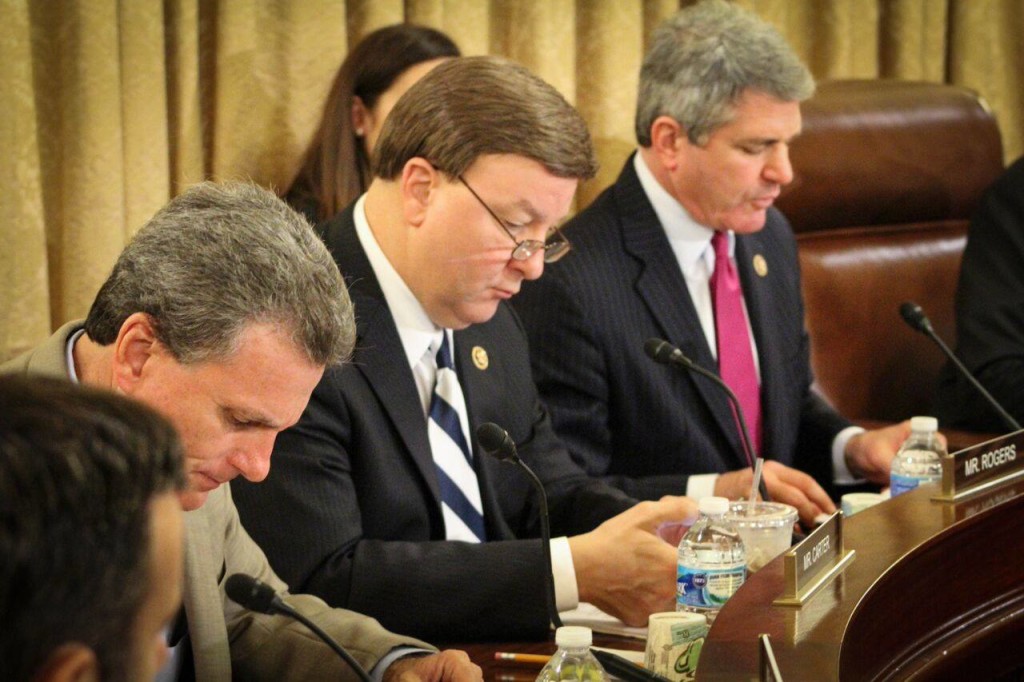
As North Korean missiles soar over the Pacific, Hawaii lawmakers are preparing for a possible nuclear attack by North Korea on the U.S. state. Many Americans across the country believe policymakers in Washington have an obligation to fund systems that can protect Americans here and now. One such lawmaker who plays a key role in Congress’ missile defense decision-making is Alabama 3rd District. U.S. Rep. Mike Rogers. As a senior member of the House Armed Services Committee (HASC), Rogers was selected to serve as Chairman of the Subcommittee on Strategic Forces, which is specifically tasked with dealing with missile defense and nuclear weapons issues. With tensions over North Korea’s weapons systems escalating in recent months — as North Korean dictator Kim Jung Un and his regime have launched tests of multiple intercontinental ballistic missiles (ICBM), some of which could reach North America — Rogers’ job in Congress in more important than ever. Especially given that North Korea recently threatened the U.S., saying it should be “beaten to death like a rabid dog” and reduced to “ashes and darkness.” Hawaii’s leaders are relying on the U.S. missile defense system, whose interceptors are based in California and Alaska, for defense. But as missile tests continue and threats from Pyongyang feel ever more viable, the question is — are America’s missile defense systems enough to defend the Aloha State? The United States? The top U.S. commander in the Pacific theater, Adm. Harry Harris Jr., told lawmakers on Capitol Hill in April Hawaii may not be protected from the North Korean nuclear missile threat. That America needed more radars and more interceptors in the Pacific explaining that the current system could be “overwhelmed” by an ICBM attack. Congress heeded the Admiral’s advice in the 2018 National Defense Authorization Act (NDAA) and passed several measures to bolster Hawaiian missile defense including the Homeland Discrimination Radar Hawaii (HDR-HI), but the billion dollar project could take near a decade to fully develop. Nevertheless, some experts believe it’s too little for a short-term threat of an attack by North Korea. Steve Bucci, a visiting fellow at the Heritage Foundation, said just that. “I’d love to say we have six months, a year, five years, to build in the improvements and then that would be more than adequate, but that’s just not the truth right now,” Bucci told the Washington Free Beacon (WFB). “We have no idea when Kim Jong Un is going to shoot a missile at Hawaii. Rogers agrees. In August, he sent a letter to President Donald Trump asking him to support the additional missile defense funding in the National Defense Authorization Act (NDAA) saying North Korea’s ICBM tests “present an increased threat to our homeland, regional stability, and the 28,500 American service members and their families deployed to the Korean Peninsula.” “This proposed funding would enhance reliability and discrimination capabilities for homeland missile defense by developing space-based sensors for discrimination and increasing the number of ground-based interceptors necessary for spares and tests, increase funding for missile defense technology research, and increase procurement of THAAD and Patriot interceptors,” Rogers explained in the letter. The NDAA is being completed now and should land on President Trump’s desk for signature soon. It remains to be seen if there is any additional funding provided for the protection of Hawaii beyond the long-term radar project.
Bradley Byrne: Preventing naval tragedies

On June 17th, the USS Fitzgerald, a guided missile destroyer with the United States Navy, collided with a merchant vessel southwest of Tokyo, Japan. The collision resulted in the death of seven Navy sailors and an additional three crewmembers were injured. Then, on August 21st, the USS John S. McCain, also a Navy destroyer, collided with a merchant vessel in the Straits of Malacca, near Singapore. This time, ten crewmembers were killed and five others injured. The death of a single U.S. service member is one death too many, but losing seventeen Navy sailors in the course of a few months is a real tragedy. The House Armed Services Committee recently convened a hearing to examine these incidents. As a member of the Committee, I was especially interested in what needed to change to prevent events like this from occurring in the future. In addition to the two tragic incidents, there were also recent incidents where the USS Antietam ran aground near Japan and the USS Lake Champlain collided with a fishing boat. Neither of these resulted in any injuries, but they did cause damage to the ships. Already, the commander of the U.S. Seventh Fleet, where all these incidents occurred, has been relieved of his command and the commanding officers of the USS Fitzgerald and the USS Antietam were also removed. During the hearing, we heard a number of different ideas and concerns from the Navy leadership who testified. Notably, the Navy made clear that investigations into these incidents are still ongoing, but I think a number of conclusions can be drawn. First, we must continue to evaluate and improve our Navy’s training programs. Today’s ships have very complex technology that requires extensive training and retraining to keep the crew up-to-speed. We also need to make sure we have enough sailors to prevent exhaustion and fatigue from adding unnecessary risk. Studies indicate that today’s sailors are working longer hours than their predecessors. Our ships require full manning to perform their missions throughout the globe. The size of the fleet is also an issue. More ships mean shorter and less frequent deployments per ship, which lessens the wear and tear on the ship and leaves more time for maintenance and training. We have 100 ships throughout the world but with a fleet that has shrunk over 40% since the late 1980s. All of these areas tie back to a major underlying issue: lack of adequate funding and funding certainty for our national defense. These are both Congressional responsibilities and requirements. We must give the Navy and the entire military more budget certainty. The Navy needs to know how much money they will be receiving each year in order to effectively plan their programs and procure new ships. I was pleased when the House passed a strong military funding bill earlier this year. Specific to these concerns, the bill called for bringing on more military personnel and buying eleven more Navy ships. Unfortunately, the Senate has so far failed to pass the military funding bill. This resulted in Congress last week passing a short-term Continuing Resolution that simply holds funding levels in place. I voted against the short-term Continuing Resolution because of the negative impact it will have on our military. It will delay maintenance periods for ships we need to send back out to the fleet and delay the process of procuring new ships, to name a few crippling effects. Of course we need the Navy to do a better job of training and operating their vessels, but Congress has to also do our part to ensure adequate funding and budget certainty. We cannot continue to underfund our military and put our sailors and service members at risk. • • • Bradley Byrne is a member of U.S. Congress representing Alabama’s 1st Congressional District.
Defense bill passes committee with support of 3 Ala. members, boosts military, supports shipbuilding

The House Armed Services Committee (HASC) voted 60-1 to authorize $696.5 billion in defense spending for 2018 Wednesday night with the support of three Members of the Alabama delegation that sit on the committee. Reps. Bradley Byrne (AL-01), Mike Rogers (AL-03) and Mo Brooks (AL-05) all voted in favor of the Fiscal Year 2018 National Defense Authorization Act (NDAA), which authorizes funding and sets policy for the entire U.S. military. Many reforms were included in this year’s NDAA, including: Increases total military spending by 10% to rebuild from our current readiness crisis; Funds a 2.4% pay raise for our troops; Reforms the military’s acquisition process to make it more efficient; Improves oversight of cyber operations; Creates a new U.S. Space Corps to oversee the evolving space domain; Increases the size of the Army, Navy, Air Force, Army Guard and Reserve, Naval and Air Reserve, and Air Guard; Supports improvements to military facilities with a focus on restoration and modernization; and Authorizes construction of 13 new Navy ships to grow toward a 355 ship fleet. “This year’s National Defense Authorization Act helps rebuild our nation’s military, boosts shipbuilding in an effort to grow our fleet, and ensures our military men and women have the resources necessary to defend our country,” said Byrne of the NDAA. “Once again, we were able to secure authorization for the construction of three more Littoral Combat Ships, which are built right here in Southwest Alabama. These ships continue to excel in the fleet, and that is a testament to the over 4,000 men and women who work at the Mobile shipyard. The legislation included language important for Alabama’s 3rd Congressional District that affects the Civilian Marksmanship Program (CMP) and the Anniston Army Depot (ANAD). Language was also included to study some of the funding mechanisms of the depot in hopes of using the information to make workload planning more dependable and consistent. “The men and women and the Anniston Army Depot work very hard to support our nation’s warfighter and I want to ensure we are doing everything we can in Congress to support them,” said Rogers. “This is the first step in providing our nation’s military personnel with the resources needed to protect America,” remarked Brooks. “The FY18 NDAA authorizes a very substantial $62 billion increase over FY 2017 funding, thereby taking significant steps to reverse military declines and addressing America’s military readiness crisis by increasing the size of the Army, Navy, Air Force, Army Guard and Reserve, Naval and Air Reserve, and Air Guard.” The bill is expected to be considered by the full House in July.
Mike Rogers calls for ‘Space Corps,’ new branch of U.S. military
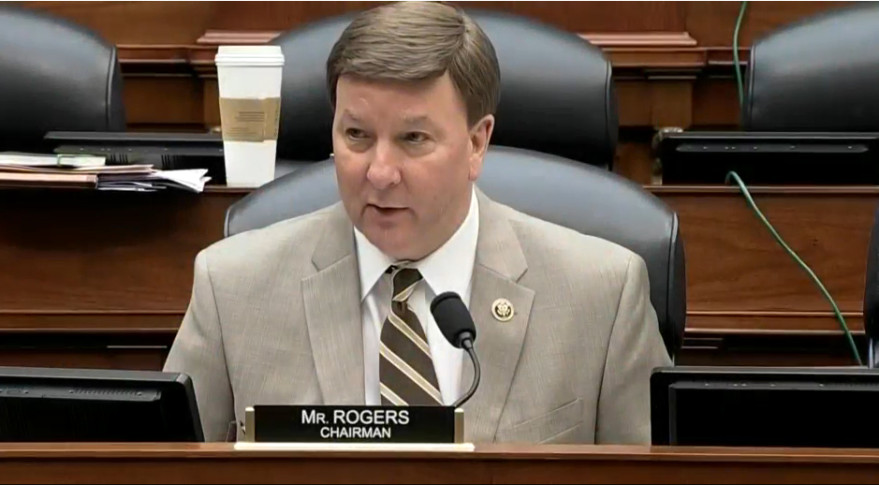
U.S. Rep. Mike Rogers wants the Pentagon to look toward the stars. The Saks Republican, a member of the House Armed Services Committee, is pushing for the creation of the “Space Corps” a new branch of the U.S. military to protect the nation’s assets in low-to-near Earth orbit. First reported in AL.com, Rogers and Tennessee Republican Rep. Jim Cooper, both top representatives on the Strategic Forces Subcommittee, presented a measure last week to the House Armed Services Committee National Defense Authorization Act establishing a Space Corps. As the first new branch since 1947 — the creation of the U.S. Air Force — the Space Corps would be under U. S. Air Force umbrella, and will protect national security and corporate interests. “There is bipartisan acknowledgment that the strategic advantages we derive from our national security space systems are eroding,” Rogers said a joint statement. “Not only are there developments by adversaries, but we are imposing upon the national security space enterprise a crippling organizational and management structure and an acquisition system that has led to delays and cost-overruns.” While technically under Air Force command, the Space Corps commander would be a member of the Joint Chiefs of Staff, similar to the Marine Corps’ within the U.S. Navy. Rogers said the Department of Defense is not sufficiently prepared to protect U.S. space-based assets, “thus Congress has to step in.” “The adversary will continue to build capabilities to hold our space assets at risk. For that reason, we must act now to fix national security space and put in place a foundation for defending space as a critical element of national security,” Rogers said. If passed, the Space Corps would go into effect by Jan. 1, 2019. The Air Force, which currently runs a space command, is pushing back on the suggestion. “From the Air Force’s perspective, we think right now it’s important to take the capabilities and resources that we have and focus on implementation and integration with the broader force, versus creating a separate service,” Col. Patrick Ryder told AL.com. Rogers’ bill still needs approval by the full Armed Services Committee, the House and Senate as well as President Donald Trump’s signature before becoming reality.
Donald Trump’s proposed big military budget no sure thing
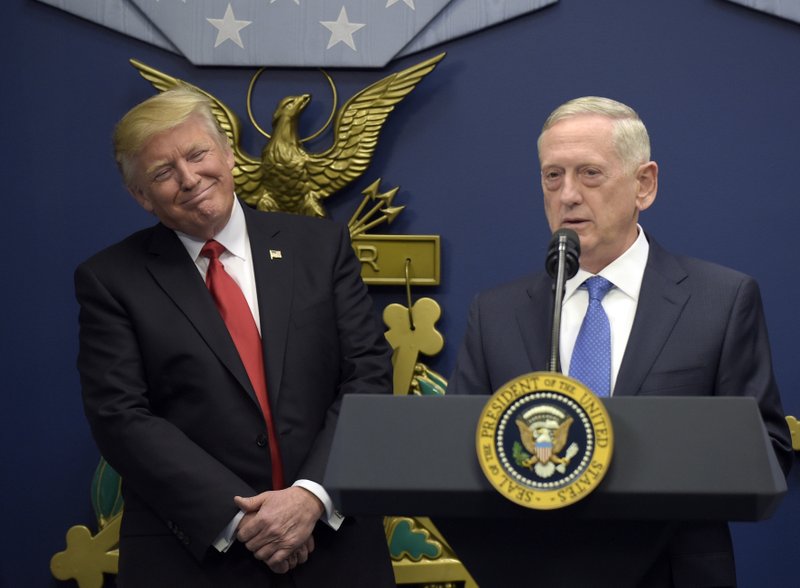
Republicans control Congress so President Donald Trump‘s pledge to boost the Pentagon budget by tens of billions of dollars should be a sure bet. It’s not. Trump faces skeptical Democrats whose support he’ll need and resistance from fiscal conservatives opposed to repealing a 2011 law that set firm limits on military and domestic spending. Unless the president figures out a way to mollify the disparate camps, he’ll have a tough time delivering on a signature campaign promise to rescue the armed forces from a festering financial crisis. Senior U.S. commanders have flatly warned that the spending caps set by the Budget Control Act are squeezing the armed forces so hard that the number of ready-to-fight units is dwindling. That means beating powers such as Russia or China is tougher than it used to be as aging equipment stacks up, waiting to be repaired, and troops don’t get enough training. Gen. Daniel Allyn, the Army’s vice chief of staff, startled many lawmakers when he testified recently that just three of the service’s 58 active-duty and reserve brigade combat teams are ready to fight at a moment’s notice. Allyn and other four-star officers pleaded during separate hearings in the House and Senate for the spending limits to be repealed, clearing the way for the bigger budgets they say are needed to stop the military’s readiness for combat from decaying further. “We need to act now before it’s too late,” said Gen. Stephen Wilson, the Air Force’s vice chief of staff. The average age of Air Force aircraft is 27 years, according to Wilson, who added that more than half of the service’s inventory would qualify for antique vehicle license plates in Virginia. On top of that, the Air Force is short 1,500 pilots and 3,400 aircraft maintainers, he said. The Navy and Marine Corps are experiencing the same turbulence. Trump, speaking at a White House news conference Thursday, said he’s ordered a plan for a “massive rebuilding” of the armed forces. He didn’t disclose how much he expected his blueprint to cost. National security hawks in Congress have suggested a defense budget of $700 billion in 2018 — more than at any point during the wars in Iraq and Afghanistan. The total, which includes $60 billion for overseas combat operations, is $91 billion over the mandatory spending cap. That’s just a down payment to begin digging out of a readiness problem the Pentagon’s top brass says will take years to fix. GOP Sen. John McCain of Arizona, chairman of the Senate Armed Services Committee, has envisioned annual increases of between 3 percent and 4 percent, culminating with an $800 billion budget for the armed forces in 2022. Securing these sizable and sustained increases will require repealing the Budget Control Act. Trump, however, has proposed to eliminate only the budget limit on defense. That’s a nonstarter for Democrats, who have long demanded parity between the two broad categories of federal spending. They’ve argued that Trump’s approach will continue to restrict the budgets of the departments of State, Treasury and Justice, all of which play essential national security roles. “We’ve always insisted, on our side of the aisle, that as long as the caps are in place, there should be equal relief,” said Sen. Tim Kaine of Virginia, the top Democrat on the Senate Armed Services readiness subcommittee. Trump will need at least a handful of Democrats on his side: It’ll take 60 votes in the Senate to undo the budget law and Republicans hold 52 seats. Republicans hold a larger majority in the House, but the party’s deficit hawks are a significant obstacle. They see the caps as blunt yet effective tools to curb federal spending and prevent the national debt from spiraling further out of control. “We’re walking into a financial train wreck that is going to have implications not just in terms of national security but in terms of everyone’s financial security,” said Rep. Mark Sanford, R-S.C. “It would be disastrous to simply abandon the caps with no other alternative in place.” But not everyone is convinced that the Pentagon is struggling so mightily. Lawmakers such as Rep. Jackie Speier, a liberal California Democrat and a member of the House Armed Services Committee, contend the current defense budget of $611 billion is already more than China and Russia spend on their militaries combined. On top of that, money is being wasted on bases and installations that are no longer needed but remain open because the GOP-led Congress has so far refused to allow a new round of base closures. “No one wants to see bases close,” Speier said. “But we have a certain pot of money and we’ve got to use it smartly.” Republished with permission of The Associated Press.
Bradley Byrne named vice-chair of Seapower subcommittee

Alabama 1st District U.S. Rep. Bradley Bryne has been named Vice-Chair of the Seapower and Projection Forces Subcommittee of the House Armed Services Committee by Committee Chairman Mac Thornberry. “I am honored to serve alongside Seapower Subcommittee Chairman Rob Wittman as we work to build up our Navy fleet and focus on deterring aggression around the globe,” said Byrne. “Our Sailors, Airmen, and Marines are the finest fighting force on the globe, and they deserve the tools and resources necessary to do their job.” He continued, “Serving as Vice Chair, I will continue to advocate for our nation’s shipbuilders, including the hardworking men and women at the Austal Shipyard in Mobile and other Gulf Coast shipyards.” Bryne has served on the full committee since coming to Congress in 2014. The Seapower and Projection Forces Subcommittee has oversight over Navy, Marine Corps and Air Force programs. Through its authorization for Navy, Marine Corps and Air Force procurement and R&D programs, this subcommittee is committed to reversing the decline in the Air Force’s Global Mobility and Bomber forces, Navy battle force fleet, strengthening the naval air component, and providing the Marine Corps warfighter with essential equipment for combat operations. “The world remains a dangerous place with threats increasing in every theater,” said Thornberry. “Ensuring that our troops are the best-trained, best-equipped, and best-supported is even more critical this year. I am encouraged by the members serving as Vice Chairs for this Congress. They bring diverse talent and experience to our committee and its’ mission.”
Bradley Byrne: Committee assignments highlight top priorities
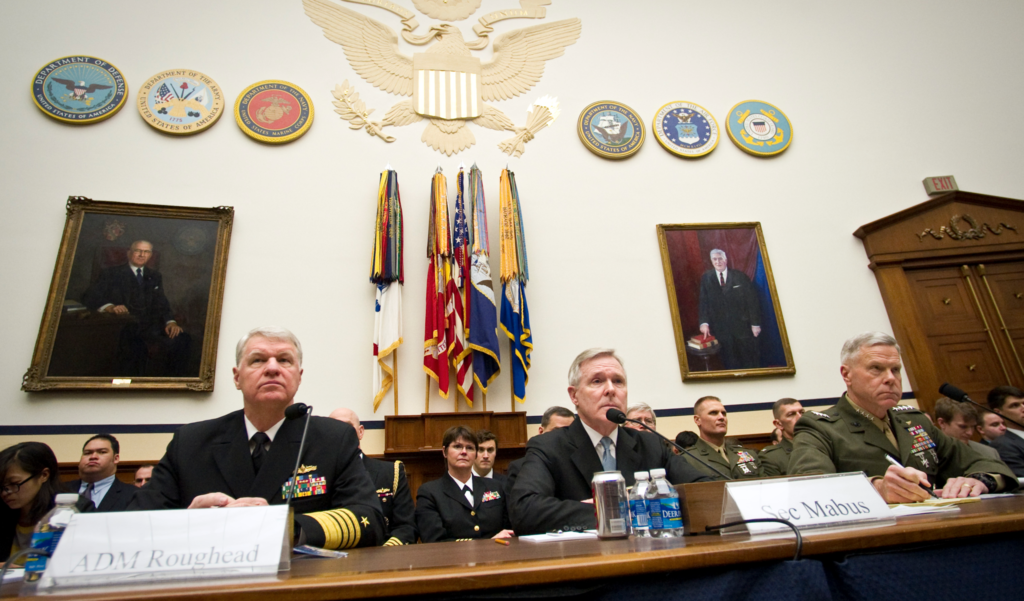
When I am not casting a vote on the floor of the House of Representatives or visiting with groups in my office, a large percentage of my time in Washington is spent serving on committees. There are currently twenty standing committees in the House, and each member of Congress serves on at least one committee. These committees are where much of the legislative work is actually done. Committees hold hearings that focus on issues under their jurisdiction. These could be oversight hearings with agency heads and cabinet officials or hearings with stakeholders or people impacted by the legislation being discussed. Committees are also where most legislation is written, revised, and vetted. After a bill is introduced in the House, it is sent to the appropriate committee. From there, the committee chairman can decide whether or not to hold a hearing on the bill or if the bill should be brought up for a vote. I am honored to serve on three committees: Armed Services, Education and the Workforce, and Rules. I want to briefly take a look at each of these assignments and outline our top priorities. The Armed Services Committee has jurisdiction over the entire U.S. military. We focus on everything from procurement of new military equipment to the health care benefits of service members to overall defense strategy. A top priority of mine on the Armed Services Committee is seapower issues, including building up our nation’s naval fleet. I believe a strong Navy is critical in terms of keeping the sea lanes open for commerce and ensuring the American people remain safe and secure. I also use my position on the Armed Services Committee to support the important military shipbuilding projects based on the Gulf Coast. This includes the impressive work at the Austal shipyard in Mobile, but also the work done at neighboring Ingalls Shipbuilding in Pascagoula. As a member of the Education and the Workforce Committee, I get to work on policies relating to K-12 education, higher education, workforce training, labor, employment, and pensions. We focus on ensuring every American has the education they need to be successful in the workforce, but also on policies that support our nation’s current workers. I am especially excited that Chairwoman Virginia Foxx selected me to serve as Chairman of the Subcommittee on Workforce Protections. Our subcommittee deals with issues ranging from wages and hours of workers to mine safety to the Family and Medical Leave Act. I really look forward to using this Chairmanship to advance policies that make life easier for our nation’s workers. Finally, I serve on the House Rules Committee. The Rules Committee is different than every other committee in the House, and it is actually one of the oldest and most powerful committees. It is the job of the Rules Committee to prepare bills for debate on the House floor. Our committee sets the terms of debate before a bill can come up for a vote. For example, we may have to decide which amendments should be allowed for debate and how long the debate should last. The Rules Committee is an especially busy committee, but it gives me a unique opportunity to have an input on almost every bill that comes up for a vote in the House. All told, I believe these committee assignments put me in a strong position to advocate for policies and legislation that are important to families, workers, students, teachers, service members, and small businesses in Southwest Alabama. • • • Bradley Byrne is a member of U.S. Congress representing Alabama’s 1st Congressional District.


